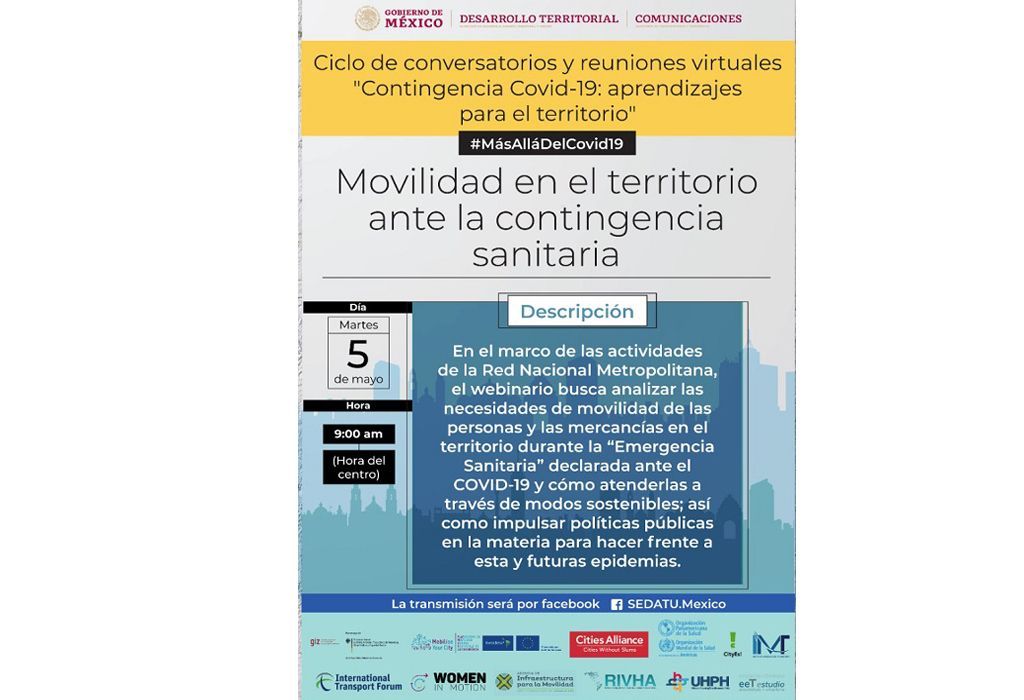The webinar "Mobility in the territory in the face of health contingencies" was held.
Mexico City, May 13.- The health emergency caused by COVID-19 has changed the dynamics of mobility in cities, highlighting deficiencies in the transport sector that lead to social inequality and have an impact on the environment and public health. How can we exchange experiences and solutions to meet the challenges and needs of mobility in the context of the pandemic?
On May 6th, the webinar "Mobility in the territory in the face of health contingencies" was held, organised by the Secretariat of Agrarian, Territorial and Urban Development (Sedatu) of Mexico, in coordination with German Cooperation for Sustainable Development (GIZ) and with the EUROCLIMA+ programme, through its Community of Practice Platform for Sustainable Urban Mobility in Latin America.
The virtual seminar stressed the need to rethink the mobility model adopted under an integral vision, which requires collective work with a multiplicity of actors. Participants included transport consultants and specialists, local and federal Mexican authorities, as well as government representatives from nine countries in the region.
“From Sedatu we have promoted the updating of official Mexican standards in all regulatory frameworks on mobility. This national vision has been built with this conjunction of wills and with the participation of all sectors: cooperation agencies, the legislative and executive branches, the three orders of government, and a lot of work from citizen organisations,” said Carina Arvizu Machado, Undersecretary of Urban Development and Housing of Sedatu.
Throughout the modules of the webinar, the experts presented the mobility needs in the territory before, during and after the health emergency. The solutions that local governments have promoted were presented and the study of the impact of the measures was promoted to facilitate the design of actions and public policies for mobility in the face of this and future epidemics, with an emphasis on climate change.
Dennis Quennet, director of the Cities, Transport and Sustainable Industry Programmes of GIZ Mexico, emphasised the role of international cooperation programmes in strengthening the capacities of the Mexican government:
"At GIZ we have platforms from the European Union’s EUROCLIMA+ project that shows many practices on sustainable urban mobility at the Latin American level. We provide access to best practices so that Mexico and its cities can take advantage of them. What we want, through the institutions with which we cooperate in Mexico, is to create changes in mobility. We believe that this is not just an economic, social and environmental aspect, but a crucial one for the vast majority of Mexicans living in cities.”
Urban planning in Mexico in recent decades has favoured an increase in vehicles, which causes environmental pollution and health problems. The speakers presented initiatives that contemplate the use of technologies, updating planning programmes, redirecting infrastructure investment, and more.
The webinar was the fifth session of the cycle of virtual talks and meetings "Contingency Covid-19: learning for the Territory", as part of the activities of the National Metropolitan Network (Renamet). Institutions such as Cities Alliance, World Health Organisation, International Transport Forum, Women in Motion, and others also participated.
Find more information about the webinar here:
https://mobiliseyourcity.net/es/node/492
About EUROCLIMA+
EUROCLIMA+ is a programme financed by the European Union to promote environmentally sustainable and climate-resilient development in 18 Latin American countries, particularly for the benefit of the most vulnerable populations. The Programme is implemented under the synergistic work of seven agencies: the Spanish Agency for International Development Cooperation (AECID), the French Development Agency (AFD), the Economic Commission for Latin America and the Caribbean (ECLAC), Expertise France (EF), International and Ibero-American Foundation for Administration and Public Policy (FIIAPP), the German Society for International Cooperation (GIZ), and UN Environment.
For more information:
This email address is being protected from spambots. You need JavaScript enabled to view it.
www.euroclimaplus.org
